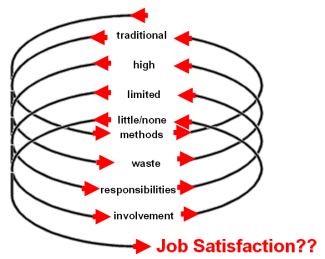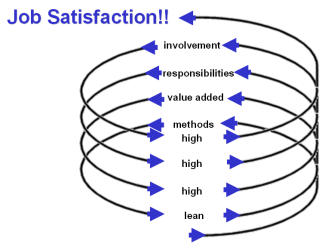|
navigation
consulting
services
training
services
specials
reading
material
resources
credits
Acknowledgement
Clipart and Media Material in this page, with thanks to:
FreeDigitalPhotos and their Authors:
Ddpavumba
|
World-Class Industrial Culture (Lean Culture)
( more »)
|
World-Class approach to Market and Clients
( more »)
|
World-Class Products and Services
( more »)
|
World-Class Operations (Lean Operations)
( more »)
|
|
Lean Human Resources Management
|
lean human resources management

People.
People make the difference between failure and success.
Because only involved personnel, using creatively their brain and taking up responsibilities can enable an enterprise to face effectively the tough challenges of the years ahead....
For several decades we have created, in industry, a number of fake "factors of competitiveness": we have believed that, in order to compete and succeed, the secret would be financial strength, or commercial abilities, or modern technology, or management style, or ....
And people?
We have a bit forgotten about people and the vital importance af truly committed personnel.....
Certainly, we have dedicated some attention to people: we have adopted the most fashionable Human Resources Management discipline of the moment, and believed that either through MBO, or MBO II, or good Leadership, or Situational Leadership, or Quality Circles, or Total Quality Management, or Self-Directed Work Groups, or Motivational Talks, or .... we would inject into people sufficient or even strong motivation so that they would jump like crickets while producing or executing their job and perform like superstars..... neglecting that
.... we have gone into the new millennium with styles and approaches to people management conceived long time ago (over two centuries) by Adam Smith (the rather famous Division of Labour principles) and perfected during the last century (by Frederick Taylor with his Scientific Management System and - most intriguing - by Unions all over the world, with their aseptic and almost "freezing" approach to personnel performance).... rather "dated"....
Such style and approaches - adequate in the mid '90s - are, unfortunately, no longer suited to face the tough challenges of the years ahead....
The Lean Philosophy, based on Lean Thinking and Lean Management approaches (more »), comes to the rescue and finally puts in order the rather horrible mess that we have built over many decades in the field of People Management.
The Lean approach to HR Management - Lean Human Resources Management (LHRM) - is based on a number of core principles:
-
LHRM believes that people and only people will make the difference between failure and success of any organization
-
LHRM believes that people can grow professionally, perform well and be good value producers
-
LHRM believes there is no space in modern industry for Pygmalion Effect episodes: managers make their people and managers must believe in people and their capacity to perform well.
In order for people to change and grow, managers must change first and scrap their "traditional" misconceptions about personnel.
Consequently, the entire Organisational Structure must change: old, obsolete, "traditional" formulas need to be scrapped, replaced by healthy Lean principles.
-
Under the LHRM angle of view, people can and must be job satisfied.
To the purpose, organisations must create the necessary conditions by giving people space or areas of purpose within which empowered personnel can act, grow, perform, improve and regain pride and dignity usurped by decades of Labour Division and Paleo-Management - while enjoying their value-adding activities.
-
The key-word is empowerment.
Which, under the LHRM angle of view is never mere delegation nor simple transmission of decision-making power and authority - or, even worse, pure concession of benefits.
Empowerment means integral transmission to people of power to act and do, but associated with responsibilities and accountability.
This closes the circle: there can be little (or none) job satisfaction when there is no accountability and responsibilities are lacking, missing or undefined.
-
In practice, LRHM shuts down once and forever bottom-of-the-ladder tasks/jobs, single-skilling, single-functioning, simple tasks/jobs, and the like, targeting instead at job enrichment first, and then re-skilling, multi-skilling, multi-function jobs.
And - most important - highlighting the concept of process as opposed to the concept of task.
-
LHRM represents the foundation of the Second Industrial Revolution (as opposed to the First Industrial Revolution based on Smith/Taylor principles).
By re-discovering the somehow lost concepts of value and process (as opposed to the concepts of non-value-adding and task), the Lean Philosophy opens wide the door to high levels of industrial (and People) performance: gradually, through job enrichment first and then through solid re-skilling and multi-skilling, personnel (NB: at all levels!), individually and/or in teams, are inserted in simple then more complex processes, which they understand, which they own, for which they are accountable and fully responsible in respect of their output value, and which they are assigned to improve and perfect over time through Lean Kaizen practices.
Such approach can generally and definitely lead to pride and job-satisfaction.
The "traditional" approach, as opposed to the Lean approach, can be schematised as follows:
Lean Human Resources Management is the ultimate, logical development of TEI - Total Employee Involvement (more »), one of the core disciplines of the TPS - Toyota Production System.
Lean Process Engineering (more »), the Figaro Model and the Ice Cream Vendor Model (more ») have greatly contributed to set and give consistency to LHRM.
|



